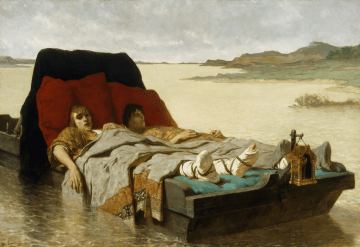Clifford Backman at berfrois:
 When one thinks about the Merovingians—and, really, who doesn’t?—one seldom thinks of the Mediterranean. There is good reason for that. Whatever else the Merovingians may have been, they were a hodgepodge of northern clans, tribes, and kingdoms who came from one end of the northern tier of Europe and settled eventually in the other. They drank beer rather than wine; cooked in lard rather than olive oil; avoided cities as centers of evil spirits; had little literature that we know of and less science; had no ships other than rivercraft; and lived, fought, and died on scattered parcels of farmland cleared from the immense, dense forest of the continent. That is not to say they fitted the prejudiced Dark Age caricature of them as mere “barbarians”—a kind of gruesome but temporary way station between the glories of Rome and Aachen. As shown by a generation of scholars from Walter Goffart and Ian Wood to Chris Wickham, Andreas Fischer, and Peter Heather, the period from Rome’s fall to Aachen’s ascent deserves to be studied for its own self and not merely as another of history’s dreary “periods of transition”; after all, every age is one of transition, and the transitions involved—political, cultural, intellectual, technological, and every other type—are usually themselves the chief points of interest.
When one thinks about the Merovingians—and, really, who doesn’t?—one seldom thinks of the Mediterranean. There is good reason for that. Whatever else the Merovingians may have been, they were a hodgepodge of northern clans, tribes, and kingdoms who came from one end of the northern tier of Europe and settled eventually in the other. They drank beer rather than wine; cooked in lard rather than olive oil; avoided cities as centers of evil spirits; had little literature that we know of and less science; had no ships other than rivercraft; and lived, fought, and died on scattered parcels of farmland cleared from the immense, dense forest of the continent. That is not to say they fitted the prejudiced Dark Age caricature of them as mere “barbarians”—a kind of gruesome but temporary way station between the glories of Rome and Aachen. As shown by a generation of scholars from Walter Goffart and Ian Wood to Chris Wickham, Andreas Fischer, and Peter Heather, the period from Rome’s fall to Aachen’s ascent deserves to be studied for its own self and not merely as another of history’s dreary “periods of transition”; after all, every age is one of transition, and the transitions involved—political, cultural, intellectual, technological, and every other type—are usually themselves the chief points of interest.
more here.
